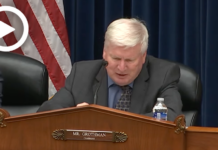The Supreme Court could soon decide the constitutionality of sanctuary policies. Before the Court now is a case that reviews the validity of California’s sanctuary-state law, Senate Bill (SB) 54, the so-called “California Values Act.” This law prohibits state and local law enforcement from cooperating with federal immigration authorities, placing illegal aliens above the rule of law at the expense of the safety of American citizens and legal immigrants.
The United States Department of Justice (DOJ) sued California on March 7, 2018, asking the federal district court for an injunction to block the state from enforcing SB 54. Numerous local governments and elected officials across the state filed amicus (“friend of the court”) briefs supporting DOJ.
But Judge John Mendez rejected DOJ’s request, saying that “refusing to help is not the same as impeding” and “[s]tanding aside does not equate to standing in the way.” The fact that the state law deliberately makes federal enforcement harder just didn’t seem to matter. DOJ appealed the ruling, and unsurprisingly the notoriously liberal and often-reversed U.S. Court of Appeals for the 9th Circuit upheld Judge Mendez’s order.
On October 22 of this year DOJ filed a petition with the U.S. Supreme Court asking it to review the case. The Supreme Court doesn’t automatically have to decide to accept an appeal on the merits – it typically gets more than 7,000 such petitions a year, and only grants 100-150 of them.
DOJ’s petition argues that the Supreme Court should take the case and reverse the 9th Circuit because:
- SB 54 conflicts with federal law and is therefore preempted;
- SB 54 discriminates against the federal government and is therefore prohibited by the doctrine of “intergovernmental immunity;”
- The information-sharing provisions of SB 54 are expressly preempted by a federal statute, 8 U.S.C. § 1373, which says states may not restrict sharing information about immigration; and
- The Tenth Amendment “anti-commandeering” principle does not apply to sanctuary policies like SB 54, because immigration is an exclusive power of the federal government, so allowing states to interfere with it makes state law supreme over federal law, which is contrary to the Constitution’s Supremacy Clause.
Solicitor General Noel Francisco, who represents DOJ before the Supreme Court, stressed that the practical consequences of California’s obstruction are not theoretical. He stated that as a result of SB 54, criminal aliens evaded both detention and removal prescribed by Congress. Instead, these criminal aliens have been returned to the civilian population, where they are disproportionately likely to commit additional crimes.
The Immigration Reform Law Institute (IRLI) also filed two amicus briefs with the Supreme Court, supporting DOJ’s petition that the Court should review the case. The first brief, on behalf of the National Sheriffs’ Association, focused on how “the Ninth Circuit misunderstood the Tenth Amendment, which only reserves the power to make a given law to the states if that power is not prohibited to the states by the Constitution,” while the second brief, which it brought on behalf of a coalition of California municipalities and elected officials, made the additional argument that “SB 54 requires state officers to commit the federal crime of harboring illegal aliens by concealing their whereabouts from federal agents.” Dale Wilcox, IRLI’s Executive Director and General Counsel, explained in a press release:
“The Constitution does not give states power to interfere with federal law enforcement … By holding otherwise, the Ninth Circuit endorsed not states’ rights, but chaos. About half of the nation’s population now lives in one form of sanctuary jurisdiction or another … That extraordinary situation is not only a grave threat to Americans’ safety, but a shocking affront to federal supremacy. We hope the Supreme Court sees the need to end these vast non-enforcement zones by vindicating the clear text and structure of our Constitution.”
Between DOJ’s and IRLI’s briefs it is clear that sanctuary policies turn federal supremacy and the entire American constitutional order completely upside-down. And they needlessly put countless victims of crime at risk.
While California has not yet filed its response to the petition, which is due by December 23, it can be expected to proclaim that the Tenth Amendment allows it to continue to undermine and interfere with federal immigration law.
If the Supreme Court does agree to hear the case, the decision would be issued by June 29, 2020, the end of the current Supreme Court session. For the sake of the country and the rule of law, the Court should take the case, reverse the lower courts, and make sanctuary policies history.
















